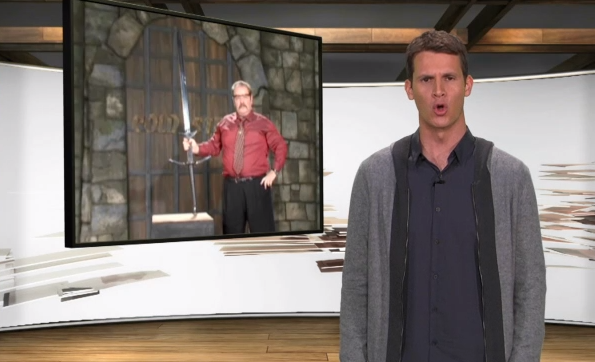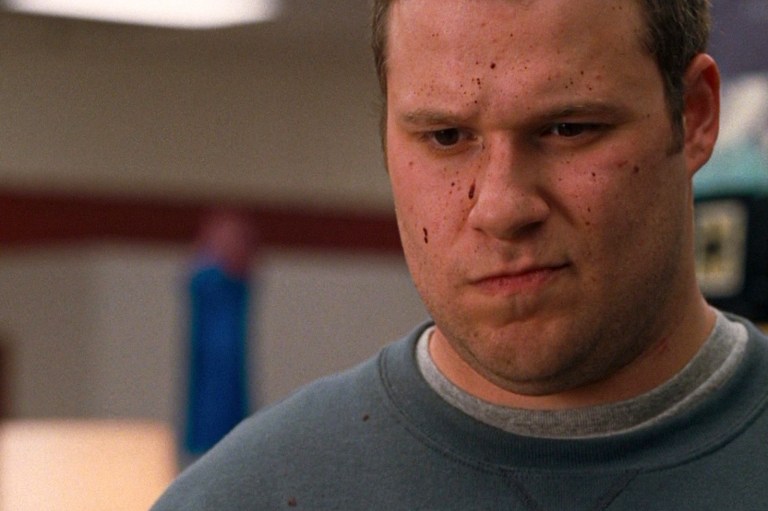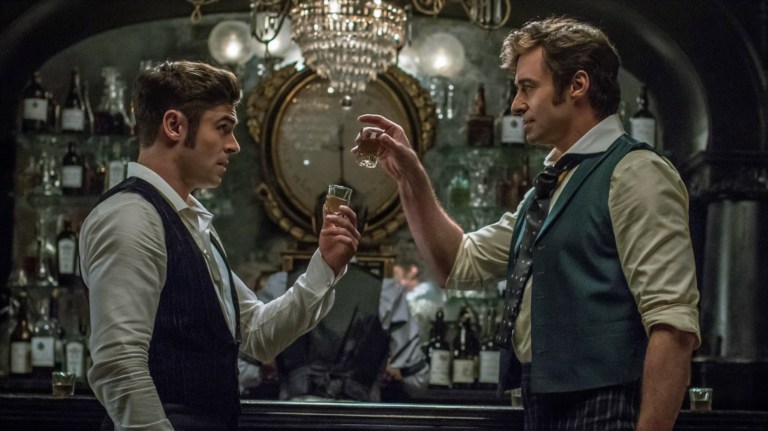
Punching Up And The ‘Rules’ Of Comedy
During the now-quarterly giant internet war about comedy and offensive jokes, a lot of frustrated, privileged hands are thrown up in disgust wondering like, what are we allowed to joke about?
By Liz Labacz

During the now-quarterly giant internet war about comedy and offensive jokes, a lot of frustrated, privileged hands are thrown up in disgust wondering like, what are we allowed to joke about? It is an important question because, as we all know, if you break a comedy rule, you will be arrested, or barred from all comedy clubs, or expelled into space through an airlock.
Haha, no just kidding, that doesn’t happen at all. When people toss around the idea of “rules” for comedy (or art in general) they are not laws or even actual rules. The bad things that happen to people who break them are like, critical backlash and, at worst, lost gigs. Sometimes, when enough of your audience doesn’t like your art, you lose your gig. That is how gigs work. Welcome to the world.
And what are the rules? No rape jokes? Rape jokes, but only if they are making fun of rape culture? Jokes that push boundaries, but only if they are punching up?
Punching up, for anyone who has been blissfully ignoring these debates, means that, in joking about taboo topics, you’re hitting the perpetrators, not the victims. It’s currently a popular “rule” for how to tackle edgy topics.
An acquaintance recently observed (and I’m paraphrasing) that for everyone who advocated “punching up,” he could probably find a comedian, or a joke, that punches down that we like.
You know what? He’s probably right. For every rule (“rule”) in art, there’s an artist that breaks it to incredible success. But for every one that does it right, there are probably 9,999 who do it wrong and take the heat in response. Writers learn the rules of grammar and some of them choose to throw them away. Without rule breakers, there would be no e e cummings. Artists are more than welcome to push the boundaries and break the rules. Maybe they’re the next e e cummings. Probably, they are not. But everyone is welcome to take a shot at it, knowing that it’s a risk. High risk. High reward. The flip side is true, too, though. If you try big, you fail big.
Everyone reading this has probably had to explain the First Amendment to someone who was sure that Daniel Tosh (or [insert name of artist here]) was being oppressed. I cannot overstate how much I am in favor of Freedom of Speech. It is your right to say things that offend me. Seriously. Anything you want. I support your right to say it and not be arrested or fined by the government. I am rehashing old territory when I note, though, that it is my right to think you’re a dick, and to say so, and that is not infringing on the First Amendment.
But more than just confusing the idea of Freedom of Speech (an unalienable right that protects you from the government, not your Twitter followers) I think people are conflating the right to say whatever they want (you can!) with the right to be listened to and paid for your words (this is not a right that actually exists) (Sometimes I wish it were! Listen to meeeeeeee).
Put plainly, artists have the right to say whatever we want. Artists do not have a right to a platform, an audience, or a paycheck. Those things are earned. If I had enough fingers, I would get that tattooed on my knuckles.
Inevitably, every time one of these debates comes up, someone (or everyone) suggests that if the offended parties can’t take the joke, they should just stay out of comedy clubs. Unfollow that twitter feed. If you don’t like it, stay away. And sure, that’s an option. But why is the answer never “if you can’t take criticism, get out of the arts?” I mean, that’s just true in general.
Am I the only one who finds it simultaneously hilarious and infuriating that the frothing, nearly hysterical reaction to being told their joke has offended someone is for comics to call their detractors overly sensitive and thin-skinned? Why is it that when a prominent feminist receives a rape threat or a female celebrity’s body is critiqued in great detail, the response is so often “that is the price you pay for being in public,” but the response to having a joke called offensive is to strike up the Bro version of “Do You Hear the People Sing?”
Stephen Fry has a screed against the word “offended.” His response is “so what?” So what that you’re offended? And you know what? He’s right. It is just a word. It has no intrinsic meaning or value. It is 100% subjective. But here’s the thing, so are things like “good” and “funny.” So when we are talking about art, and specifically art that demands audience and compensation, those subjective modifiers begin to matter. As an artist, it is my right to say “so what? So. The Fuck. What?” when someone calls my art offensive. History is littered with artists who have done just that. High risk, high reward. But to think you can take big risks without there being uh, risk, is ludicrous, silly, and childish. The surgeons that go down in history break the rules, because they had the skill to do so and they deemed the risk important enough to take. But if they fail, there are consequences. The same is true of comedy, and the consequences are so very, very much less dire.
I guess the thesis of my argument, for the people who are up in arms about the legions of offended pushing back against their art is: ohmygodshutup. Shut up, you big babies. Not like, legally. Let me clarify one more time, I am not saying you should shut up for fear of legal retribution. I’m saying you should stop whining and just say whatever it is you want to say, so long as you are willing to accept the consequences.
And I swear to god, if someone tries to tell me that society is more critical or restrictive now than ever before, I will build a time machine and drop you back to live with the Comics Code or the Motion Picture Production Code The thing is, that criticism usually served to protect the people already in power.The difference is that there are more people finding a voice, who suddenly expect artists to care about their feelings. So hard, I know! But the whole of human history involves people being sensitive to the feelings of the privileged. This is just extending the same courtesy. Let’s all put away the guitars and stop strumming the ballad of persecution. ![]()











